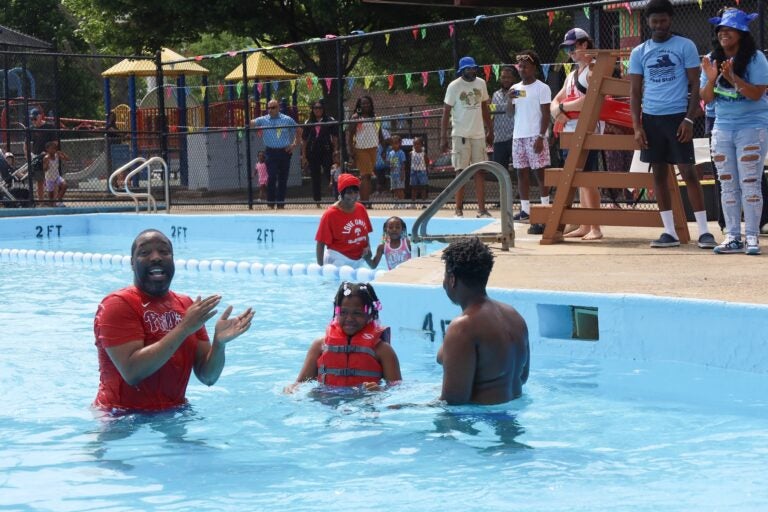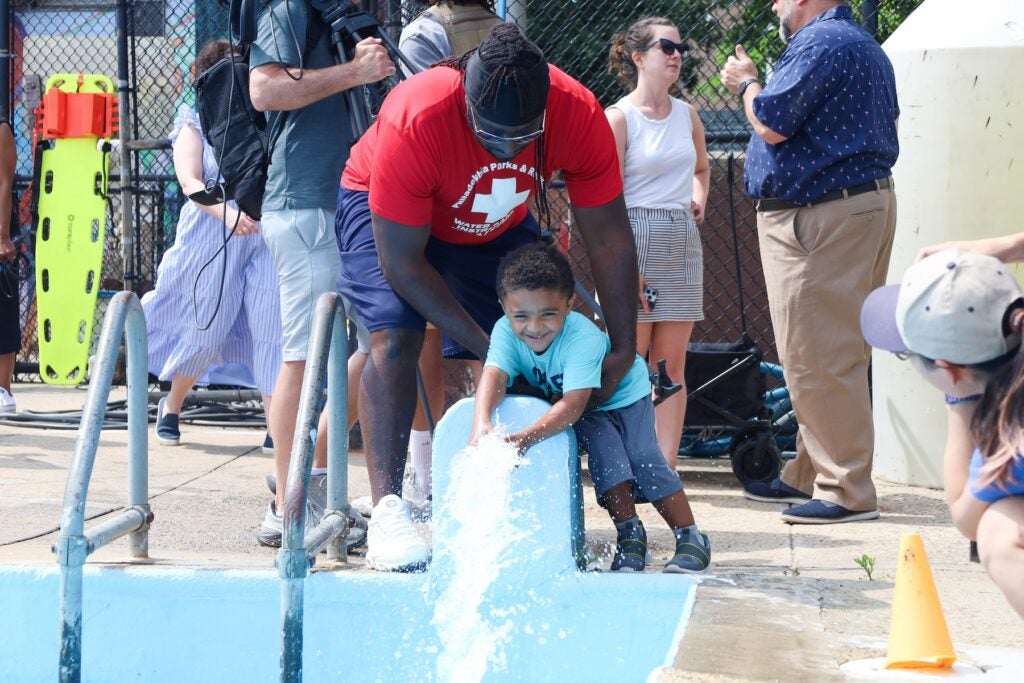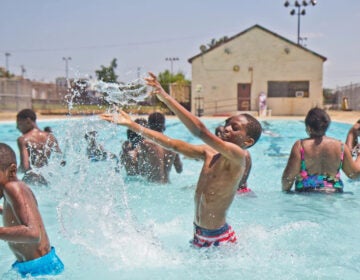Pools and beaches offer a reprieve from extreme heat. Philly-area health experts stress water safety amid rise in drownings, lifeguard shortage
Fatal drownings among young children nationally rose 12% from 2020 to 2021, according to a new federal report.
Listen 1:58
Averie Billups (center) with her brother, Ashton Billups (right) and Philadelphia City Council President Kenyatta Johnson (left) jump into the public pool at Chew Playground on Mon., June 17 to mark the pool’s opening day for summer. (Nicole Leonard/WHYY)
How to cope with a Philly heat wave
- Have questions about enduring extreme heat in Philly? WHYY News has the answers
- Here’s what a Heat Health Emergency and a Code Red means for Philly residents
- Looking to cool off in Philly? Here’s where you can find pools
- Learn how to protect yourself and loved ones, what happens to the body in extreme temperatures and how heat becomes deadly
- Plus: If you’re going out in the heat, here are 8 mistakes to avoid
From Philly and the Pa. suburbs to South Jersey and Delaware, what would you like WHYY News to cover? Let us know!
Siblings Averie and Ashton Billups jumped into the clear blue water of the deep end of the public pool at Chew Playground in South Philadelphia on a recent Monday morning.
They joined neighbors and community members to mark the pool’s opening day.
“It was cold, but not that cold,” Averie, 9, said later of her first dip. “Sometimes, [Ashton] does handstands underwater and I do, too.”
“Handstands, yeah,” Ashton, 12, said. “I do backflips underwater.”
The Billups siblings first learned how to swim here at the Philadelphia public pool, which offers free lessons to neighborhood kids and local summer camp programs. Their mother, Angela Sawyer, said that water safety was always important for her family.
“Very important, because anything can happen,” she said. “They could save a life, I could save a life.”
But despite awareness campaigns about water safety and efforts to teach more children and adults how to swim, drowning deaths among young kids nationally rose 12% between 2020 and 2021, according to a new federal report released earlier this month.
The U.S. Consumer Product Safety Commission found that a majority of fatal drownings occurred among children younger than 5 years old, and nearly a quarter of all drownings were disproportionately among Black children and teens.
The uptick in drownings, coupled with an ongoing national lifeguard shortage that has caused some local programs to limit or delay swimming lessons, has Delaware Valley health and aquatics experts stressing the importance of basic water safety and drowning prevention.
“These things happen in seconds and they’re silent,” Dr. Erin Muckey, emergency physician at Rutgers New Jersey Medical School, said of drownings and water accidents.
Drowning risks and prevention
The risk of drowning is higher among children and adults who can’t or don’t know how to swim. That’s why Muckey said learning even basic water safety skills could prevent a fatal drowning.
“Something that we always wanted to teach little ones and big ones how to do is to be able to flip over onto their back and be able to float with their head [above] the water,” she said. “Because that’s something where just that skill can give them a little bit more time to get rescued.”
Of course, being able to swim well is ideal, but Muckey said not everyone has the same opportunities to learn.
“You have to have access to a body of water, a pool, and you have to be able to afford swim lessons or have a community that offers swim lessons,” she said. “That is not always available for everyone.”
Swimming lessons at Philadelphia public pools are free, an initiative designed to eliminate financial barriers to water safety and training programs. Other local organizations like the Salvation Army Camden Kroc Center offer lessons at low cost or with financial assistance.
At the Kroc Center in Camden, instructors provide year-round swimming lessons to adults and children as young as 6 months old.
Julian Olivo, assistant aquatics manager, said many people begin with little or no swimming abilities, others come in with a fear of water and swimming, and some may just want to strengthen existing swimming skills.
“The program is designed to be able to accommodate any of those folks,” Olivo said.
Center instructors also offer education and awareness on basic water safety in different swimming environments.
“One of the things that we’ve been letting people know is to not be complacent,” said Salvation Army Major Richard Sanchez. “Make sure that you’re aware of your surroundings. Just because people are around doesn’t necessarily mean that there are safety precautions there.”
While the Camden center has sustained a full roster of lifeguards, the Salvation Army Kroc Center in Philadelphia has put swim lessons on hold “due to a shortage of lifeguards that are certified for providing swim lessons,” according to a statement on its website.
Lifeguard recruitment efforts
Recruiting new lifeguards, and at the numbers needed to staff pools, beaches, lakefronts, water parks and other venues, is an ongoing challenge, say leaders at the American Lifeguard Association.
The association says higher wages, flexible hours and other benefits can make certification and positions more appealing.
Philadelphia Parks and Recreation Deputy Commissioner Anne Marie Dunne said staffing levels dipped during the COVID-19 pandemic, “but I like to think that we’re getting beyond that.”

Dunne said the city has offered bonuses, free trainings and other opportunities to make people want to come back to lifeguarding during the summers.
“We’ve retained so many of them that now we’re at a good threshold where we’re just recruiting new ones to fill the gap,” she said, and added that swim lesson programs help build on that. “It’s one way to get kids comfortable with water, to teach them how to swim, but also we want to build our next generation of lifeguards and keep that coming.”
Additional water safety tips
Whether a lifeguard is on site or not, Muckey said there are things people can do to reduce their risk of drowning. At private residences and pools, it means having a designated “water watcher” for children.
“Someone who’s not on their phone, they’re not talking to anyone, they’re just watching the kids in the water,” she said.
Muckey said children and adults should wear U.S. Coast Guard-approved life jackets and vests when on boats or while participating in water sports, which can prevent someone from drowning if they suffer a head injury or fall unconscious in the water.
Checking the weather and water conditions ahead of time for ocean swimming is always a good idea, Muckey said, because even experienced swimmers can drown in rip tides and harsh conditions.
People should not swim while intoxicated, or jump or dive into water where the bottom is not clearly visible, Muckey said.
If a child goes missing around or near a body of water, Muckey recommends checking the water first before anywhere else.
When someone does drown and is pulled from the water, rescuers and bystanders should first call for emergency help, Muckey said. They should then check for breathing and clear the mouth of any debris or blockages.
People trained in rescue breathing and CPR should administer lifesaving skills when appropriate, she said.

Get daily updates from WHYY News!
WHYY is your source for fact-based, in-depth journalism and information. As a nonprofit organization, we rely on financial support from readers like you. Please give today.





